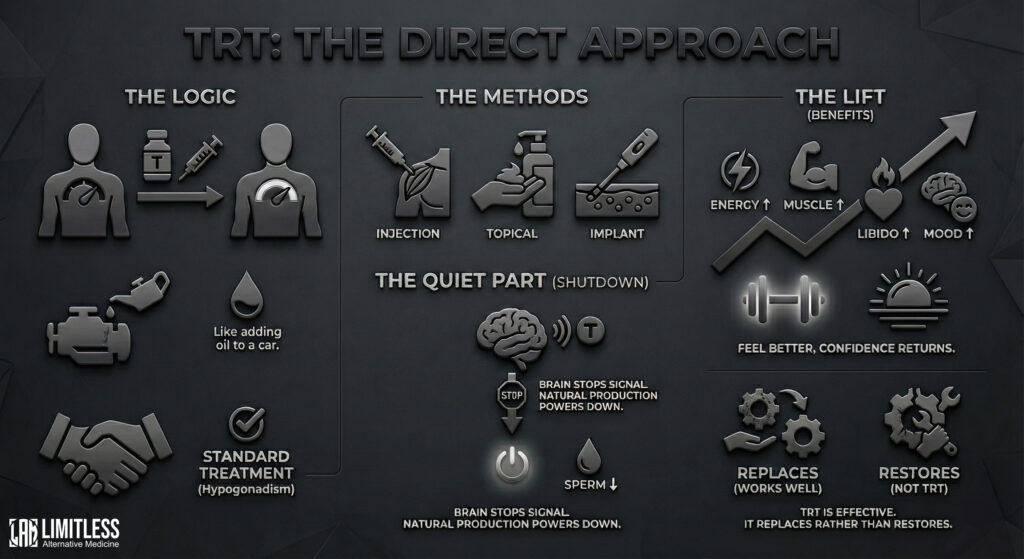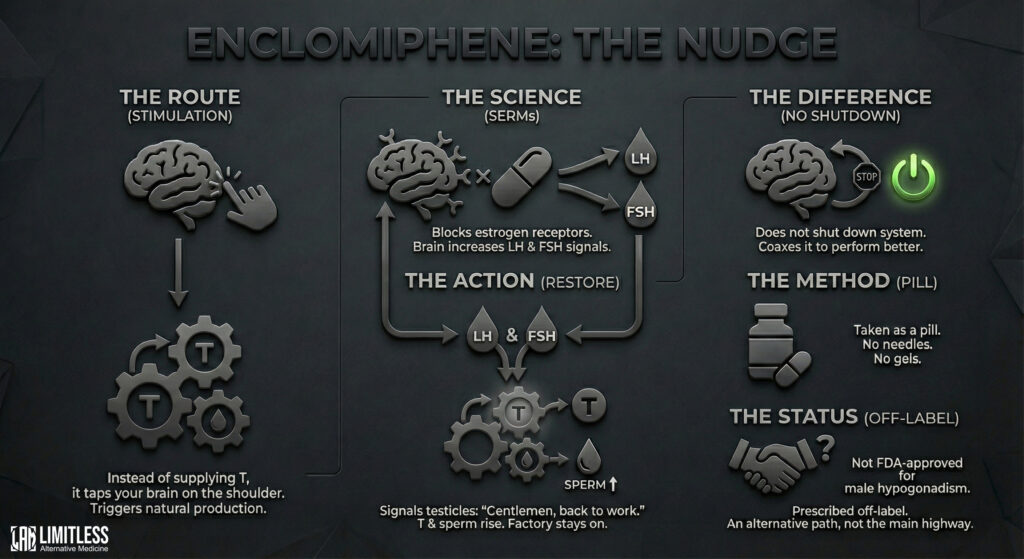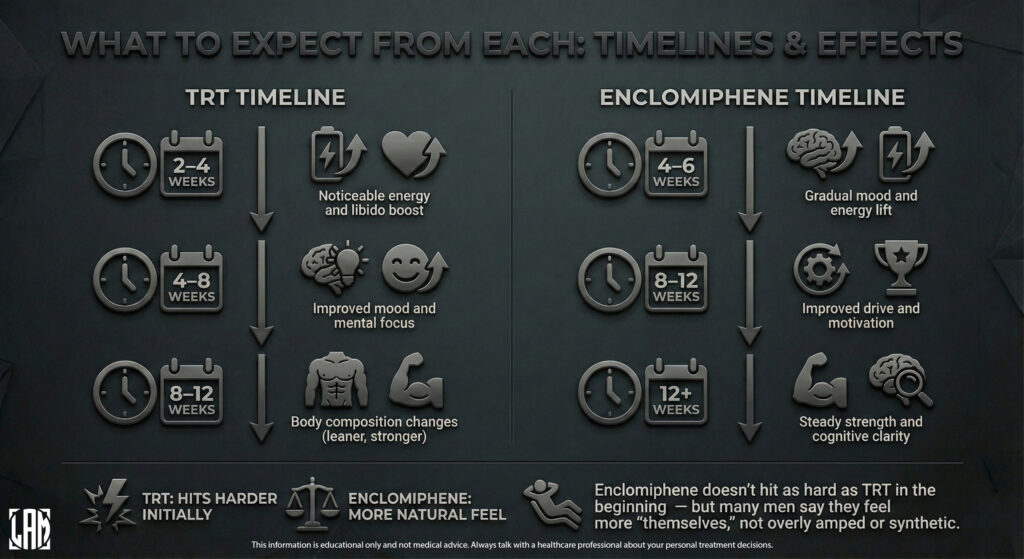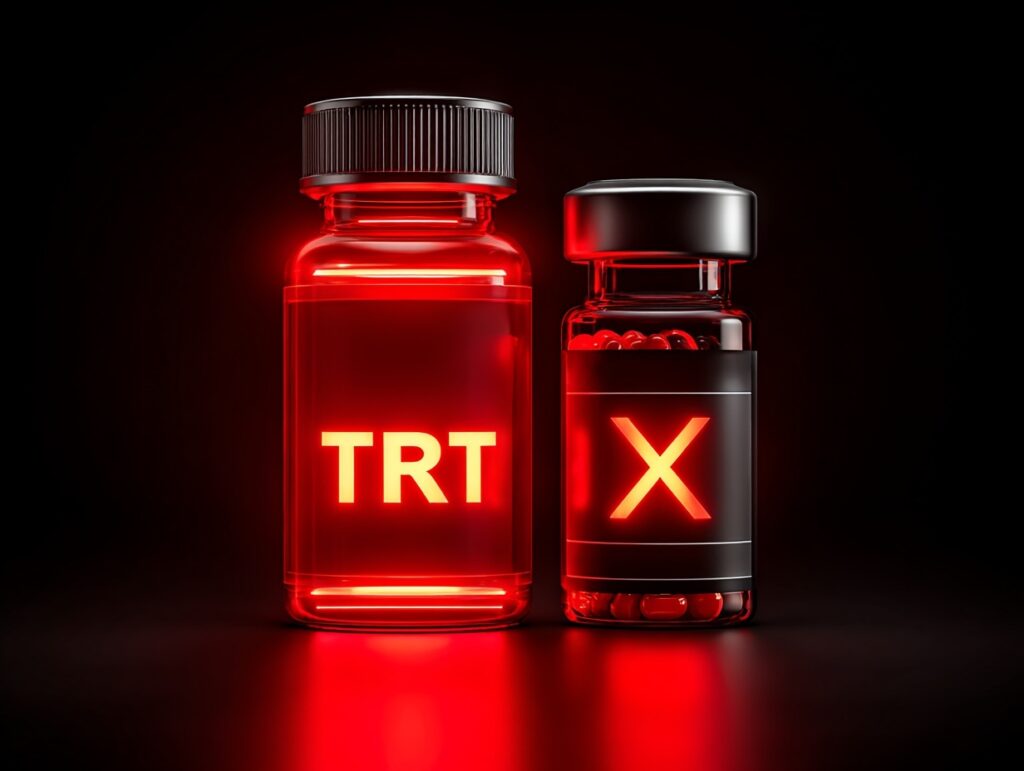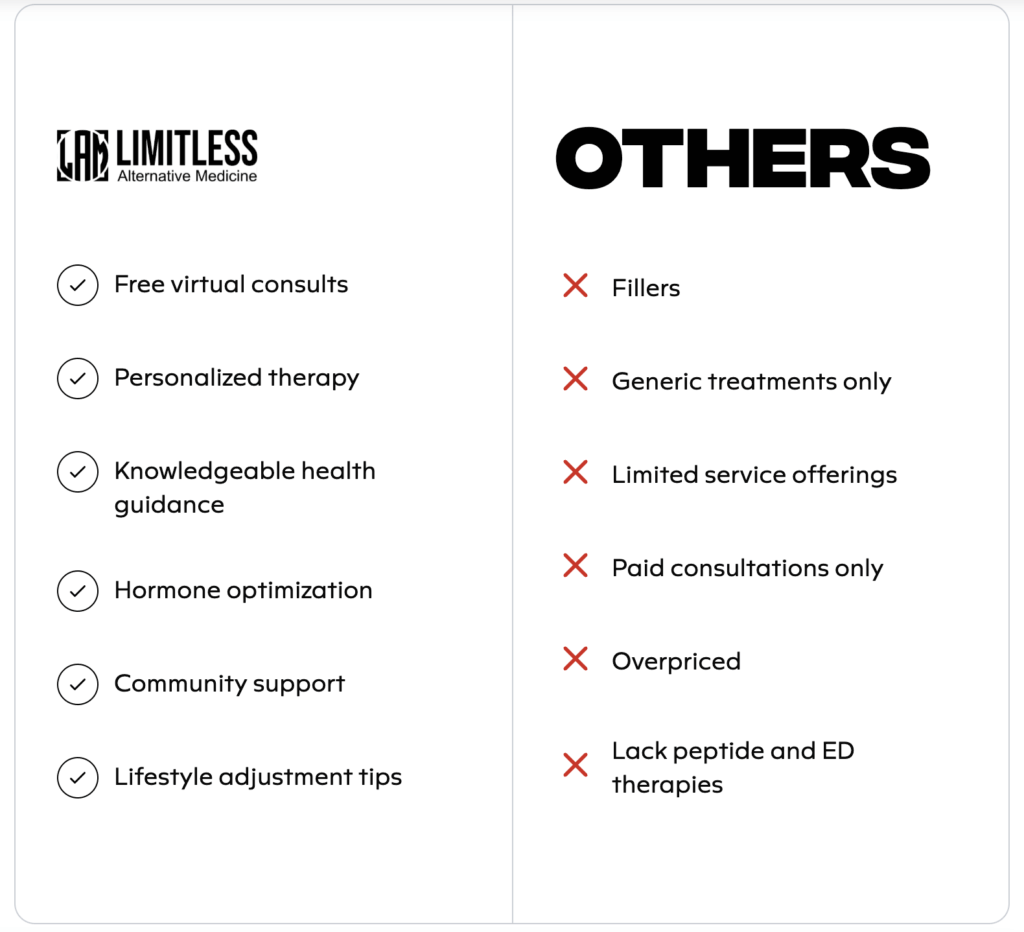For anyone thinking about buying TRT and wants the real story — the stuff guys only talk about after the gym lights go off.
Ever notice how every guy knows someone who’s “on test”?

You’ll be sitting around, maybe after a workout or grabbing dinner, and someone casually drops:
“Yeah, my cousin’s been pinning 500 mg a week and feels amazing.”
But here’s the part they don’t tell you:
A few months later, the same guy’s cousin feels like he got hit by a truck, has acne like a teenager, and can’t remember the last time he woke up with morning wood.
I’ve heard this story so many times it should honestly be its own Netflix category.
And if you’re reading this, you’ve probably wondered:
“Is TRT actually different from all that?”
“Isn’t testosterone just testosterone?”
“Why are some guys on TRT thriving while others running cycles look like a rollercoaster?”
So let’s have the honest conversation people rarely have — the difference between modern TRT and traditional testosterone use (cycles, underground stuff, locker-room advice, all of it).
And I promise, this won’t read like a lecture. Let’s talk like friends.
What TRT Actually Is (Not What Instagram Says)

Most guys think TRT is:
“Just taking test so your levels go up.”
But real TRT — the kind you get from a medical clinic that actually checks your labs — is more like giving your body the testosterone it should already have, and keeping things stable.
Modern TRT is:
- Prescribed by medical providers
- Based on bloodwork (multiple markers, not just total T)
- Dosed to keep you in a high-normal range
- Aimed at long-term health, energy, libido, mood, body composition
- Monitored regularly
- Stable, consistent, predictable
There’s no “blast for 12 weeks and hope your body forgives you.”
No guessing your dosage.
No mystery vials.
No DM-ing a guy named “Big Mike” whose profile picture is him flexing in a garage gym.
TRT is steady.
Think cruise control, not drag racing.
What Traditional Testosterone Use Looks Like
(If We’re Being Honest)
Let’s call it what it is:
Underground cycles. Gym-bro dosing. Blast and cruise.
That world is basically fueled by:
- High doses
- Zero medical supervision
- Inconsistent product quality
- Hormone rollercoasters
- Post-cycle crashes
- Google (and hope) as your doctor
Guys don’t talk about the aftermath.
And trust me, there is an aftermath.
You can run 500 mg/week of Test E and feel like Superman for 3 months.
But the real question is: What happens after those 3 months?
Most guys don’t have a plan.
Most guys don’t use proper ancillaries.
Most guys don’t know their levels.
Most guys don’t PCT correctly (or at all).
And most guys end up worse than when they started.
Traditional testosterone use is basically a “short-term boost, long-term tax.”
Why Guys Confuse TRT With Cycles

Honestly?
Because on the surface, both involve needles and testosterone.
And because social media turned testosterone into a personality trait.
But the actual experience?
Night and day.
Picture this:
Traditional cycle:
You feel incredible for 6–10 weeks.
Your lifts explode.
Your confidence skyrockets.
You’re sweating through shirts like you’re sponsored by Gatorade.
Then suddenly:
Your libido drops.
You feel tired.
Your mood tanks.
Your natural testosterone shuts down.
And you’re scrambling to find clomid, nolva, — all while hoping your body remembers how to make hormones again.
TRT:
You feel… normal.
Not over-the-top.
Not manic.
Not fried.
Just finally like yourself again — every day.
You don’t crash.
You don’t “cycle off.”
Your levels don’t swing like a yo-yo.
It’s sustainable.
The Big Difference: Hormone Stability

This is where people either nod or get confused, so let me break it down like we’re sketching it on a napkin.
Traditional testosterone use = spikes + crashes
You’re blasting supraphysiological levels, then hoping your body recovers.
TRT = stable, healthy levels year-round
You keep yourself in the high-normal range and maintain a predictable baseline.
It’s like the difference between:
- Chugging 4 energy drinks → feeling amazing for an hour → crashing
vs. - Drinking good coffee every morning → feeling consistently sharp
Your body loves consistency.
Your hormones especially.
And for guys who are low T, it’s not about becoming a superhuman — it’s about becoming yourself again.
Side Effects: The Truth No One Warns You About

Traditional Testosterone Use Side Effects:
And I say this from actual stories I’ve heard:
- Acne so bad you’re Googling “is this normal?”
- Water retention that makes your face look like you lost a boxing match
- Mood swings
- Rage (yes, it’s real for some guys)
- Hair loss
- Estrogen spikes that make your nipples sensitive (not in a fun way)
- Zero libido after the cycle ends
- Balls shrinking
- Total shutdown of natural testosterone production
- Anxiety during and after
- Long-term fertility issues
- Blood pressure going up
- Thickened blood (hematocrit)
And yes, the guy “at the gym who’s totally fine” is lying about at least half of these.
TRT Side Effects:
Much fewer, much milder, and medically managed:
- Mild water retention
- Possible rise in hematocrit (monitored and easily addressed)
- Changes in estradiol (adjusted by dose or protocol)
The difference is simple:
With traditional use, you manage side effects alone.
With TRT, your provider handles them before they become a problem.
Legality & Safety (People Pretend This Doesn’t Matter)

Traditional testosterone (cycles)
- Illegal
- Unregulated
- Often mislabeled
- Unknown sterility
- Often underdosed or overdosed
- Sourced from someone who “knows a guy”
- Zero accountability
TRT:
- Prescribed
- Legal
- Pharmaceutical grade
- Lab-tested
- Dosage is exact
- Providers are accountable
- Treatment is fully documented
One path is guessing.
The other is health care.
The Emotional Side People Never Talk About

You know what guys don’t talk about enough?
The insecurity that pushes them into traditional cycles.
A lot of men start cycles because:
- Their friend is doing it
- They feel behind in the gym
- They’re tired of being tired
- They’re embarrassed to admit they want help
- They think TRT is “for old men”
- They think quick results mean better results
But there’s a hidden cost:
When the cycle ends, so does the confidence.
I’ve had guys tell me:
“I felt amazing on cycle, but afterwards I felt like I lost myself.”
This is why medical TRT exists.
Not to turn you into a bodybuilder — but to help you feel whole again, consistently.
Why More Guys Are Choosing TRT Instead of Cycles
1. They want to feel good year-round, not only for 8 weeks.
Simplicity wins.
2. They want medical oversight.
Because guessing is exhausting.
3. They want legal, pharmaceutical-grade testosterone.
No more brown vials from mystery sources.
4. They want stable mood, libido, and energy.
Not “up for two months, down for two months.”
5. They realize TRT is the long-term solution.
If you’re low T, cycles won’t fix you — they’ll break you further.
6. They want to stop worrying about crashes.
TRT eliminates the post-cycle blues that ruin guys mentally and physically.
Health Markers: This Is Where TRT Wins Every Time

Medical TRT doesn’t just give you testosterone.
It gives you data.
You’re monitoring:
- Testosterone (total & free)
- Estradiol
- SHBG
- Hematocrit
- Lipids
- Liver enzymes
- PSA
- Thyroid markers (in many cases)
You actually know what’s happening in your body.
With traditional testosterone?
You’re monitoring:
- Your gym pump
- Maybe your mood
- Maybe your nipples
- And your friend’s advice who “ran this cycle last year”
This is a massive difference.
Who Should Choose TRT (Honestly)?

If you’re reading this and thinking:
- “I’m tired of feeling tired.”
- “My libido isn’t what it used to be.”
- “My energy and focus feel off.”
- “I feel like half the man I used to be.”
- “I always crash after cycles.”
- “I want consistency, not chaos.”
Then TRT is likely the better path.
TRT is for guys who want:
- Long-term vitality
- Stable hormones
- Predictable, healthy improvements
- Clear mental focus
- Consistent energy
- Better mood and sleep
- Normal, healthy libido
- Sustainable progress in the gym
It’s about longevity.
Quality of life.
Feeling like a man again — without destroying your hormones in the process.
This isn’t creatine.
It isn’t pre-workout.
It isn’t fish oil.
Traditional cycles treat testosterone like a supplement.
TRT treats testosterone like a vital component of your health.
One approach is reactionary.
The other is responsible.
The Real Point: You Deserve to Feel Like Yourself Again
If this whole article hits close to home — the fatigue, the mood drops, the slow mornings, the loss of drive — that’s not a sign of weakness.
It’s a sign your hormones might need support.
And once you’ve lived with low T long enough, you start to forget what “normal” even feels like.
Imagine waking up with energy again.
Imagine wanting sex again.
Imagine not dragging through the day.
Imagine having patience, clarity, confidence.
Imagine being steady instead of irritable.
That’s what TRT gives men when it’s done right.
Ready to Feel Like Yourself Again?

If you’re seriously thinking about TRT — not cycles, not guesswork — you owe it to yourself to work with a legit provider who actually monitors your health.
Most guys wait years.
You don’t have to.
Start TRT with Limitless Alt Med — and get 5% off your first order.
They’ll walk you through the entire process, handle your labs, dial in your dose, and help you feel like yourself again — consistently.
👉 https://limitlessaltmed.com/
Your future self will thank you.
Medical Disclaimer: This blog post and the entire limitlessaltmed.com website are for informational and educational purposes only and are not a substitute for professional medical advice, diagnosis, or treatment.
Read More:
- TRT Dosage: How Much Testosterone Do You Actually Need?
- BMI & GLP-1 Eligibility Checker
- Causes of ED Under 40: What’s Really Going On and What You Can Do About It
- What Is TRT? A Beginner’s Guide to Testosterone Replacement Therapy
- Testosterone Injections vs Gel vs Pellets: Which TRT Method Is Right for You?










